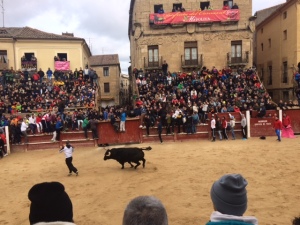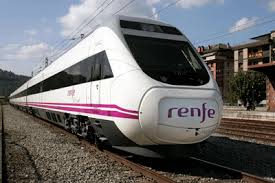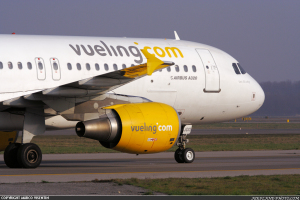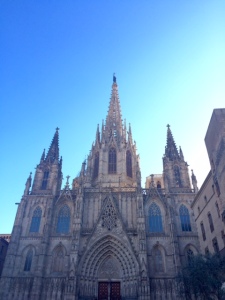As a college student, traveling on a budget is a must! Although Europe is a bit pricier than some other study abroad destinations, traveling Europe while studying abroad in Spain can definitely be affordable. Studying abroad should be filled with adventure, fun, and learning, therefore there is no need to stress about money problems. Follow these 25 helpful tips on saving money while traveling abroad!
General tips:
- Research your destination
- Being a lost tourist is never fun, make sure to check travel blogs and websites to gain a better idea about what to see, how to get there, and to read the reviews of fellow travelers. This will help you decide if visiting a particular tourist attraction is worth the money. Be sure to double-check multiple sources as everyone has their own opinion. A great website to try is Trip Advisor.
- Travel in groups
- Traveling in groups is not only safer and more fun, but it helps reduce the cost of lodging (shared room or apartment), transportation (shared taxi), and meals (you can share a few dishes instead of each ordering your own).
- Travel locally
- Spain has so much to offer! Despite its small size it is an extremely rich, diverse, and historic country. There is so much to do and see you could spend years exploring Spain. Each region and city has its own unique cuisine, architectural style, landscapes, and local culture. Check out our other blog post on the Best Places to Visit in Spain!
- Save on ATM fees
- ATM fees can be costly, especially if you are repeatedly taking cash out. It is best to pre-calculate your budget for each trip and take it out all at once or in 2-3 increments to avoid paying unnecessary ATM fees.
- Use free WiFi
- There is WiFi almost everywhere you go. Sometimes there is free Wifi on public transportation and in local plazas. There is almost always WiFi in hotels, hostels, cafes, bars and restaurants.
- Using WiFi instead of an international data plan allows you to text for free via texting applications (Whatsapp and Viber) as well as surf the Internet to make travel plans.
- Inform your bank before leaving the country
- Banks monitor any suspicious activity in your accounts, and any foreign transactions send red flags to your bank. Make sure to tell your bank you are traveling so that they know yourcard hasnt been stolen, and wont deactivate your card.
Transportation:
- Make a plan:Rome2Rio is a great website that shows all possible routes from point A to point B via train, bus, boat, plane, or shared car. It is a great way to choose the cheapest and/or quickest mode of transportation to reach your travel destination.
- Have flexible travel dates and times
- Avoid flying on peak travel dates (the weekends) and peak season (summer/spring).
- According to studies done by FareCompare, there are a few helpful tips to purchasing cheap flights.
- Flying on a Tuesday, Wednesday, or Saturday have the most availability, thus cheaper seats.
- The best time to book airfare is Tuesday at 3:00pm
- Search for flights first thing in the morning.
- Travel at undesirable hours: take flights at the crack of dawn or the red-eye.
- Use budget airlines and compare prices
- Prior to purchasing your flight, we recommend you use a 3rd party website to compare prices. Websites such as skyscanner or kayak will allow you to look at all the offers and flight details on that day. Once youve found the best offer, it is best to go directly to that airline providers website to book your ticket. This will ensure you dont pay any extra processing fees, and that there will be no funny business at the airport when you go to check in.
- The most commonly used budget airlines in Europe are Ryanair, Vueling, EasyJet, Air Europa, and Norwegian Air.
- Overnight trains
- Taking an overnight train, many of which have a sleeper car option, allows you to save on transportation and lodging all in one!
- Shared Rides
- In the last few years a new form of affordable transportation has emerged in Europeshared rides. Its a modern form of carpooling! Websites such as Blablacar and Amovens allow you to make arrangements with fellow travelers and ride together to a given destination. It is a great way to meet people and practiceyour Spanish!
- Public transportation
- Most European countries have great public transportation trains, trams, and busses. There are often 3-day passes, 10-ride packs, or weekly/monthly discounts. Be sure to ask about these options as they usually make taking public transportation more affordable. Also if you are traveling in a group, a 10-ride pass can be shared amongst multiple people.
- Rent a bike/Walk
- Walking and biking is a great way to see the city while staying active! As you walk you can soak in the culture of the locals, wander the city, and see amazing sites. Plus its the cheapest form of transportation!
- Sometimes walking can be tiring, so try renting a bike to cover larger distances and at a faster pace.
- Spain is home to some of the best hiking and bike trails. Spains historic cities are fascinating, but its nature is truly breathtaking.
Tourism:
- Go to the tourist office
- This is a great way to orient yourself when you first arrive in a city! The tourist office can explain the most important places to visit (which are worth the splurge), how to get around efficiently and affordably, and which tourist attractions are free of charge!
- Use free entry days
- Many museums and monuments offer free entry once a week or month. Planning based on these special offers is a good budget saver.
- Always carry your student ID with you
- Student discounts throughout Europe will save you a ton of money. For example the Alcazar in Sevilla is only 2 euros with a student ID, and 9 euros regular entry.
- Free walking tours
- This is one of the best ways to save money and learn a lot about your travel destination. Hostels and tourists offices offer daily free walking tours. At the end it is usually customary to give your guide a small tip if you enjoyed the tour.
- Explore nature and national parks
- Spains wildlife and nature are sometimes overlooked; however Spain has some of the most spectacular mountain ranges, coastal landscapes, and national parks. One of the best ways to enjoy free tourism is to go hiking, ride a bike, swim in the natural rivers, or lay out at the extensive beaches.
Lodging:
- Rent a local apartment
- Renting a local apartment can be cheaper than staying in a hostel, and it allows you to interact with locals and get insider tips. You can rent an affordable room in someones home, or if you prefer and are traveling with more people you can rent the entire apartment. Airbnb is an excellent website to find your ideal accommodation.
- Stay in a hostel
- Hostels, although less glamorous than a hotel have the option for shared dormitories. You can share a room with many people at a lower cost and it is an excellent way to meet international friends! Plus youll hardly be in your room as you will be out and about exploring your new surroundings. Take a look at Hostelworld to read reviews and opinions of fellow budget travelers.
- Camp
- Spain and Europe have a number of well-kept and designated campsites. Camping will give you a chance to relax and enjoy nature. The price of sharing a campsite and renting equipment is generally cheaper than staying in a hostel, apartment, or hotel.
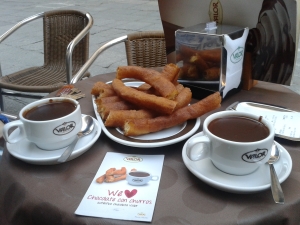
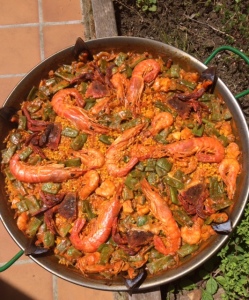
Dining:
- Dine away from the touristy streets
- Tourism is a business, and the restaurants and businesses near the cities attractions know this. Usually restaurants in the city center raise the prices and arent necessarily the best quality meals.
- Meet locals
- There is nothing better than asking a local for dining recommendations. Chances are they know the best places to try the local cuisine, where to find great ambience, and where has good quality food for a reasonable price. Some of the best meals are found in the least touristy zones.
- Cook
- Most hostels have communal kitchens, which are a great opportunity to cook and save money on not eating out.
- Take advantage of included breakfasts
- Many hostels and hotels offer a deal for included breakfast. Eating at your accommodation saves time and money.
And the final tip…..JUST ASK!
If you are unsure of where to eat, the best form of transportion, affordable places to stay, etc., just ask the local people! They are sure to know the best hot spots and tourist attractions and they are better than any blog or guidebook you will find!
What are some of your best travel tips? Let us know!







